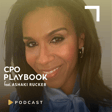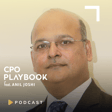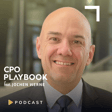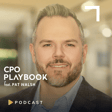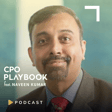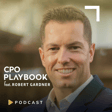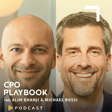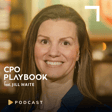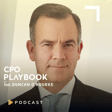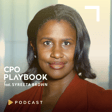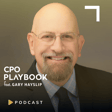Introduction to CPO Playbook
00:00:01
Speaker
I'm Felicia Shakiba, and this is CPO Playbook, where we solve a business challenge in every episode. Workplace culture. Everyone acknowledges its significance. But how do you build it, sustain it, and harness it to boost your bottom line?
How Does Workplace Culture Begin?
00:00:21
Speaker
Where does culture originate, and how do you begin to foster it? How much time should you invest in cultivating culture versus acquiring new customers? And ultimately, what is the true value of a strong company culture? Joining
Role of Company Culture in Business Performance
00:00:36
Speaker
us to unravel these questions is the CEO of Planful.
00:00:40
Speaker
a pioneering force in financial performance management cloud software based in San Francisco. Today, Halloran shares his experience on the importance of company culture, best practices for reinforcing it, and how leaders can effectively assess its value. Grant, many of us know company culture is important, but why is it important to you? sharere All of the success factors that one can think about in running, any business, any organization, I truly believe that culture is the most important factor. The reason I believe that is that your culture helps you sustain your performance.
00:01:23
Speaker
for all the highs and lows of running an organization. We're living in a very dynamic world. Lots can go wrong inside your company, and there's lots of things that are happening outside of your business, whether it's geopolitical or supply chains or pandemics or a new competitor comes along, whatever it is. These are extremely unpredictable factors that we we live in and running an organization. Our best laid plans often get pushed aside. And I think what's most important is you have to try to be the most successful you can be given the conditions you're operating in. And
Discovering Culture as a Success Factor
00:01:59
Speaker
I truly believe that your culture is what ultimately helps for that.
00:02:04
Speaker
And I'll just say throughout my nearly 30 year software executive career, I've been searching for that silver bullet for so long. Like what's the silver bullet that makes you stand out and be really successful? And I would say in the last five, 10 years is when I truly discovered that it was culture. Well, let's talk about planful because it's easy to talk about culture from a high level, but I'd love to learn from you, how did it begin to cultivate at planful? very We could spend a lot of time talking about the history, but I'll do the nearer terms. so The private equity backers have planned to acquire the company at the end of 2018. I joined the company six months later. I'd had some experience in this software category and was fortunate enough to be appointed the CEO mid-19. The culture was quite different before Grant.
00:02:59
Speaker
and compared to what it's been afterward. And I would say our culture has continued to evolve and and grow and improve in the five years that I've been here as the CEO. And I think this is perhaps a little obvious to your audience, but it's worth making the point that, of course, it's going to be different because when we talk about the changes that we made here at Paypal, it's all about your people. So when you bring new people into management and you bring a whole bunch of new folks into the company over time, Your culture will, by definition, change because it's your people's beliefs and behaviors that are going to ultimately form your culture.
Shaping Culture at Planful
00:03:38
Speaker
And I think what we'll talk about today is how you can be very intentional about creating the right type of culture, a structured way of thinking about it versus just having a whole bunch of random things happen in your company. So it has evolved quite a bit, and I'm really keen to talk about our culture today and some of the things I've learned in my career.
00:03:58
Speaker
Well, let's dig into that a bit. Were there any specific actions that you took or behaviors that you were conscious of displaying on a regular basis to reinforce and communicate the company's culture? Because many people are looking at executives to set the example. And so I'd love to learn, what did you do? First, this, I think, is a very important point. It started with vision from me. I had a vision of the type of culture that I wanted in the company that I was going to lead. And to just give you some idea of that, I wanted intellectually honest culture, no BS, no bad politics. I wanted a fast paced culture in terms of decision making, lack of bureaucracy. I wanted a culture that was intensely focused on winning.
00:04:51
Speaker
That means they hated coming second and third, which happens happens a lot. Competitive nature. You're competitive nature, right? So it's loving, winning, and just not feeling great when you lose. That's a good thing. So long as, and a culture, frankly, where people can pay each other the greatest compliment, which is to show up at work and be yourself. I think that's a fantastic, that's one of my ways of thinking about diversity and inclusion is let's create ah an environment where people can show up and be themselves. The caveat to that though, is so long as these people buy into our core beliefs, core values, and and try as hard as they can to exhibit the ideal behaviors that live those values. right So we want diversity, but I don't want diversity of culture. I actually want it fairly as our company culture, if that's not clear. I wanted our company culture to have a commonality across it. And we've invested a huge amount in that. I think we can talk about some specifics of how we evolve to this place. But the first specific I would give you is
00:05:53
Speaker
I had that vision, but it wasn't written down. It was just new and I saw it in my head. This is all these different activities
Leadership and Cultural Change
00:05:59
Speaker
in a business. I knew Howard was to look and I saw the types of people that I wanted in the organization. and The very first thing I did from an action perspective, Because I brought in the top leaders, the top executive leaders into the company that I knew fit that vision very specifically. These are folks that I've worked with in my career, in some cases many times in my career. So I had a head start, if you like, and in getting the culture moving in the right direction. What about hiring outside executives?
00:06:32
Speaker
Yeah, we've hired quite a few. So in the first year or two, we brought on upwards of 35. If you look at the executive and VP levels, 35 new people. So not all of these folks had worked with me before. Some of them had. And of course, some of the folks I brought in then brought in some folks that they had worked with before. But again, it was it was very clear to everybody that we wanted certain types of people that were going to really enjoy this type of culture that we wanted. So I think you've got to build ah culture. If you want to change a culture, you need to start at the top. I really believe that. So the second specific action back to the question is we went through quite a lot of change in the first six, seven months. We're private equity firms, we buy a new company. Often your mandate is, hey, we've got a vision about what we want this company to be and time is critical. So we went through quite a lot of change and fairly dramatic business improvements.
00:07:26
Speaker
Obviously, a lot of new folks coming in. We then reached a period where we could breathe a little bit more, a sustained period of stability, if you like. And
Formalizing Culture with 'The Planful Way'
00:07:35
Speaker
that's when we created our culture in a formal way that we call the plan for way. And we actually wrote our book. This is our culture book, and every employee gets a copy of it. When they join the company, it's a very big part of our onboarding. It's a big part of our recruiting. I think we can talk about that as well. And what that book does is it explains our five core values, and it unpacks in a narrative. So it's not prescribing exact types of behaviors, but it gives lots of examples of the types of
00:08:05
Speaker
behaviors you see when people are living out those values. And I say it's not to boast or anything, but just I think it's important point is I wrote a lot of book, especially there are whole parts of it. So to the full, the introduction is fully written by me and not edited by anyone else. I wanted people to just hear directly from me what I thought about it. And that's not to any arrogant perspective. It's more that I truly believe that culture begins to the CEO of the company. And if the CEO is modeling the right behaviors, and I get it right all the time, of course, then you've got a very good chance that others will start to model those behaviors and it starts to ripple through the company. Now, I do want to point out 1.8. So how did we come up with the values? Now, in your experience, Felicia and me in the audience, you're bringing consultants and you go through the values, little card deck, and there's all these different techniques. So many different ways, right? So many different ways. So I'll tell you what we did that we found very effective. So we got a group of leaders together. I can't remember exactly. It might have been 15, 20 leaders together. And what we did is we got in a room, we said, we're not leaving this room until we feel good about about the outcome we get from this. I hope you had a good delivery.
00:09:20
Speaker
drift what asshwood that's It might have been a bottle of wine or two later on involved who knows but so what we did is we just did a very simple exercise. We are several in the room think of the people in the organization that you've worked with here and maybe anywhere else i want you to think of specific people that are super high performers. and everyone loves working with them, right? So they're consistently high performers and everyone loves working with them. You'll know the person, the audience can think of people right now, right? I'd say to people, you'd feel like it was a crisis if this person came to you and said, hey, boss, I'm leaving, I'm going somewhere else. So you'd be like, no, no, these are the people that you really want in the company. Everyone loves them, everyone loves working with them, everyone wants to be on their team or their project, those sorts of people.
00:10:09
Speaker
So we got a list of people together and we wrote them down and we put up their faces on the screen. And then we said, okay, what is it about these people? what How do they behave? So we said, what are the specific things they do? And we just got people to tell stories. Oh, this guy, like he would just work till midnight sometimes if if a project has to have to has to be done and whatever it all is. That's just one example. right And so we got out all these examples. Then the third part of this was we then said, OK, what are they exhibiting? What is the behavior? yeah And one out one of the sort of cool behaviors for us is being an environment shaper, not an environment taker.
00:10:45
Speaker
Right? So these are people that say, well, we need to go and change this process. So we need to make this happen. Who wants to come with me and go and make this better versus an environment taker says, we should be doing this. We should be doing that. They're just whining about it. And they accept the current situation and they're not surely going and leaning forward with an action bias. So that's just one example that we started to see these themes emerge, behavioral themes emerge amongst all these people. Once we had that, we said, that's our book. That's our book. These people are like truly passionate. They'll always do the right thing for customers. They humble themselves. They put their team ahead of themselves. When something great happens, they're always like, they always talk about the team. It was the team that did great. And that always defer the celebration and the praise to somebody else. When something bad happens, they say, well, I could have done this better. I gave bad instructions. I didn't give enough clear direction. It's not my chain's fault. It's my fault. They're just examples. And then that's how we evolved the value around teams. And then the narrative, unpack that in the storytelling way. That's how we got to it. So look,
Integrating Culture into Daily Activities
00:11:48
Speaker
that's a long-winded way of saying these are some of the specific actions of how we got to a
00:11:53
Speaker
the abstract concept of culture and bringing it into some concrete form where you can recruit around it. You can nurture those behaviors. You can celebrate those behaviors. You now have a construct where you can say, hey, you're behaving a certain way. This is not in line with the sorts of behaviors that we value in this company. Can you see what we're talking about? And you're sort of depersonalizing it. It could say, yeah, actually you're right. I'm sorry about that. I'll try to do better and do this behavior. So hopefully that answers your question. Okay, so you figured out how to originate the culture, something that's abstract and conceptual, and now you've identified those behaviors and organized the communication in such a way. Now what do you do?
00:12:41
Speaker
You have to live it. ands I think the easy way to answer this question is to say, well, once you've got your culture, you expect everyone to just go out and behave those ways and just hope for the best. But I think you actually have to be very intentional with how you make that happen or try to make it happen. At least it doesn't happen all the time. right So this is something you have to keep investing in. Some examples. So when I start my weekly ELT, executive leadership team meeting, we spend the first 10, 15 minutes going around the room where every executive is asked to tell name a person and tell a story about what this person did to live our values last week. And often, and we encourage this, often it's somebody that's not in their department, right? So that's my little way.
00:13:29
Speaker
That's my little way of demonstrating to my executive team how important I think it is. I'm willing to invest the first 15 minutes of a 90-minute meeting in that topic, and then I encourage them to do the same with their leaders when they're having their meetings. We have tons of shout outs. We're a very real-time company. We use Slack Messaging System. Shout out Slack. I think it's a fantastic tool. Others might debate me, but it works great for us. There's a lot of shout outs happening and a lot of engagement from the leaders in the company around those responding to people. Oh, that's awesome. and
00:14:03
Speaker
That is really cool because there's this constant stream of celebration and calling out the specific values that the person exhibited. Some other examples are we have quarterly awards winners for values. So we have people do the nominations and there's voting on that. And then we have annual awards winners. So the people that, throughout the year, consistently did that. The annual awards winners go to our President's Club. So in a lot of software companies, the President's Club has traditionally been reserved for the domain of salespeople. People with a quota. They hit their quota. They get to go at to P Club. We just had a fantastic event in Lake Como in Italy. We go to exotic places like Mexico. and And it's a very prestigious thing. All expenses paid. Bring your partner. It's a fantastic thing. And it's always been the salespeople. And I said, well, no. Our performance as an organization just in sales is a byproduct of everyone's effort, building great product and doing great marketing and hiring fantastic people and recruiting. It's the whole company together. So we extended that. Now it's say only half of the folks that go to the P Club are the salespeople and the other half are folks from different departments, key contributors, and the five values awards winners, the annual awards winners get to go and bring their partner.
00:15:18
Speaker
or a plus one for that event. and So again, we're putting our money where our mouth is the right expression. There's just some examples of how we do it out each day. The final thing I would say is that the book itself is a living document, so we're up to version three. And it's actually on me. I'm meant to be redrafting one of the chapters. It's a longer story about how I've done that and then left a laptop somewhere and hadn't synced it up and I've got to rewrite it.
00:15:44
Speaker
I love that you've wrapped the values and behaviors around recognition. And it's not just recognition in a small portion of the business, it's everyone sees it, everyone sees how they behaved or what they did, what they accomplished. I think that speaks volumes to the dedication that you have and the executive team and the business, the people in the business have to those values. How do you keep people accountable? For example, performance management is often viewed as a cultural driver because they provide you have to do finish your OKRs, your goals, but there's also those soft skills and those values. Do you weave values and behaviors into your performance review? What does that look like?
Performance and Cultural Alignment
00:16:30
Speaker
we're a continuous performance review company. So we don't do the formal annual reviews. I'm sure that's a hot debate for a lot of people in your audience. But I just found we think of performance, we're very metrics driven company. So at the end of the day, you need to perform. for your stakeholders. And those are all measurable results. So those are not lost. One of the misnomers, I think for folks that are perhaps earlier in their careers, they think about culture as all this fluffy stuff. And oh, yeah, we've got such a fun culture and all the stuff.
00:17:01
Speaker
At the end of the day, the culture is there to serve the stakeholders in terms of helping you achieve the best metrics, the best results. So back to your question, the values, how people show up and behave are just implicitly written into our managers, how our leaders engage. and engage with and evaluate their employees, right? That is a huge part of it. Recruiting, so we use a form of behavioral targeting interview techniques where we ask people to tell stories about what they've done in the past, just as part of our overall recruiting process.
00:17:36
Speaker
And so I personally will spend a lot of time focusing on things like, tell me about a time where your team had a huge outcome, a huge result. That was so amazing. And I will then spend 15 minutes unpacking that whole story around what actually happened, who did what. And I'm looking for, I can tell after many years of doing this, whether that person truly is humbling themselves and giving a lot of produce team. And then I'll ask the Converse question, tell me about a time where you guys created a mess and unpack that story. And again, I'm looking for them to take responsibility. So in recruiting, this is a very big part and we try to teach our folks getting people to do consistent recruiting techniques, interviewing techniques is more challenging than people might imagine. But we try our best to systemize that through our interviewing system.
00:18:28
Speaker
Just things like that. In
Recruitment and Employee Engagement
00:18:30
Speaker
terms of making it very tangible as well, we do a quarterly engagement survey, and we have an employee MPS score. We track that very intensely. That's probably my number one metric that I try to track, and we we see that I'm most interested in. And then we unpack that with specific scores for this, probably six or seven very specific culture questions. We have a positive culture score your thing. I feel that I can show up and be myself at this company, those types of things. Then we've got all the HRIS data that I think are proxies for whether your culture's good, average tenure, things like attrition, regrettable attrition, all those sorts of things that maybe in your audience would probably already be tracking. I might actually have a mail-out chief people officer write a blog on this just to share with folks.
00:19:16
Speaker
what we do around that and then we have recruiting which is a little bit more our employment brand but i think it's also if you have a great culture. You can recruit more easily because you get to get people who you can reach the people and our recruiters are incredible and one of the reason i say yeah what course you to want to talk with us so your recruiter was so amazing. And you bring them in, but then what's the experience like of meeting the financial folks? right That is such a huge factor in whether you can attract the great talent that you want to your accompany. Too many organizations make employment your employer brand but this really esoteric thing. At the end of the day, we're all brand ambassadors for our culture. And if we show up the right way, then we've got a good yeah much better a chance of recruiting really great people.
00:20:03
Speaker
I think that's a smart way of thinking about it. I think employer brand is so, it's a such an investment to make, but it really works for you, right? I mean, there's a lot less pull and a lot more high performers looking around for those great cultures. And they do check, they go to Glassdoor, they ask around, they ping people on LinkedIn that work for your business. And that's how they find out whether or not they're even going to apply. And then that could be the deciding factor between what your company and another of when they work there. And then
Impact of Employee Culture on Customers
00:20:35
Speaker
that's a lot of time and investment that you're taking to woo those top performers. But when you have a great employer brand, it really does a lot of the work for you. And it really stems, like you said, the culture internally. You can't make an employer brand without having that match whatever is going on in the business.
00:20:55
Speaker
Yeah, the rubber has to hit the road at some point, and that is when the candidates are engaging with your people at the company. So you can spend an ordinary amount of money. The example, you started my career in banking. I remember one of our competitor banks did this huge campaign where this was targeted at customers, but and but the same principle applies. And it was always happy, wonderful people in the bank. This is back in the day when people actually went in to the bank branches and everyone was so happy and the service looked so amazing. And it was like all service with a smile and all this sort of stuff. But the reality is when you walk into one of the branches, it was horrible.
00:21:33
Speaker
Right. And so I'm like, why are you spending all this money on millions, tens of millions of dollars on these stupid ad campaigns? And then the promise is never delivered. And this is the other thing that I will say to you. You're going to ask me a question about how is this tangible in terms of results? Just while I talk about the bank story, I think I can use this really interesting story for people to think about how employee culture, like company culture, impacts your business in a very tangible way. If you go into a coffee shop or you go into a restaurant,
00:22:06
Speaker
And those employees are happy and they're having fun. They're doing great work. They're making great coffees. They're bringing you fantastic cocktails and and food and everything else. And you can feel the buzz and the energy. You can immediately tell this is a really great place like this to work. People love working here. They're engaged with each other, they're smiling, they're happy, and it projects to the ah overall ambiance and service that the customer gets. Guess what? I'm willing to go back to that place forever, and I'm going to spend more money there than I will anywhere else.
00:22:39
Speaker
at those places. So don't tell me, people tell, you know, it's like anyone wants to tell me that your employee culture, your company culture doesn't have a very tangible outcome on your customer experience and having repeat customers and then spending more money with you and getting more value from you. Just think back to that story. And then in a software company, it's the same thing. We've had customers join us, come and work for us, many, many of them, because they come to our user conference events. And they get to rub shoulders with hundreds, maybe a thousand other people, and they get to experience these powerful people. And they're like, I want to work there. So it has so many incredible economic impacts to your company. If you can create a culture where people love to show up to work and they want to be there for each other, they're there shoulder to shoulder helping each other. I think that is everything we should strive for.
00:23:32
Speaker
Well, I think your retention rate should be in a good place if that's the case, right? It's the best it's ever been for us. That's good to know. I do have one last question for you. What
Creating or Refreshing Company Culture
00:23:46
Speaker
advice would you give a startup founder or even a longtime CEO looking to either create or refresh their company culture? I think you have to begin, like I said earlier, you have to begin with a true vision. What I mean by that word is being able to close your eyes and in your mind's eye, see the culture. So if you're a startup founder or somebody that has just joined a company or it feels like they need to renew the culture, go away for a few days, go ahead in the nature, whatever, and just spend time uninterrupted time really visualizing it. You would hope that the CEO is perhaps the most
00:24:28
Speaker
visually capable person. Often that is the case where the CEO is meant to be a bit more visionary, less operational. So truly see it. What do you see? What do you feel? What do you hear? And just own that and feel that emotionally, right? And then, once you've done that, you've allowed yourself that time to just wade in that pool for a while, then you can go and be a bit more concrete, start to write it down. What are the words that you'd use to describe Real Vision? And then, I think many, many companies have done this differently, but the advice you ask, because you're asking me, I'll tell you what worked for us, which was a lot of what I've talked about is we knew what we wanted.
00:25:06
Speaker
when they're able to get the right people to come in to exemplify that vision behaviorally and then just built from there and then we codified it so now it's scalable okay and then we nurture it we nurture it we give it. life, and we modify it when things aren't working. And Felicia, we make mistakes. It would be remiss of me to not say it. We've made mistakes as well along the way. And I think the most common mistake that we've made, there's many, but the most common one is where we let, for want of a better expression, anti-culture people stick around too long. They're good performers in the company, and we let them stay too long. And one example is someone recently that was a really high performer. We thought, let's coach them. Let's coach them.
00:25:51
Speaker
And eventually, they just lost their team. The team truly felt that they that this person was only interested in themselves and not the team. They were being selfish. And that is antithetical to our core value of teams, humbling yourself, putting your team ahead of yourself. So that's when we finally were able to say, okay, this person, you're going to be happier somewhere else, right? So let's let you go on that journey. And then of course, everyone's relieved and we realized we should have done it quicker. So that's just an an example of of having ah a concrete culture, a truly tangible culture, if you like, enables you to course correct when you're getting it wrong as well.
00:26:34
Speaker
So yeah, that's it guys. I would give to people.
Conclusion and Further Exploration
00:26:36
Speaker
So hopefully that's helpful and people can reach me on LinkedIn if they want to know more or chat with me directly. Grant, that's fantastic advice. I love how you brought through all of the intangibles and shared how you make them tangible and what CEOs and executives roles are in spreading and nurturing the values of the business and upholding them. So thank you so much for your time. Thanks for being here. Good pleasure. Thank you for reaching out.
00:27:08
Speaker
That's Grant Halloran, Chief Executive Officer at Planful. If today's episode captured your interest, please consider sharing it with a friend or visit cpoplaybook dot.com to read the episode or learn more about leadership and talent management. We greatly appreciate your rating, review, and support as a subscriber. I'm Felicia Shakiba. See you next Wednesday and thanks for listening.



